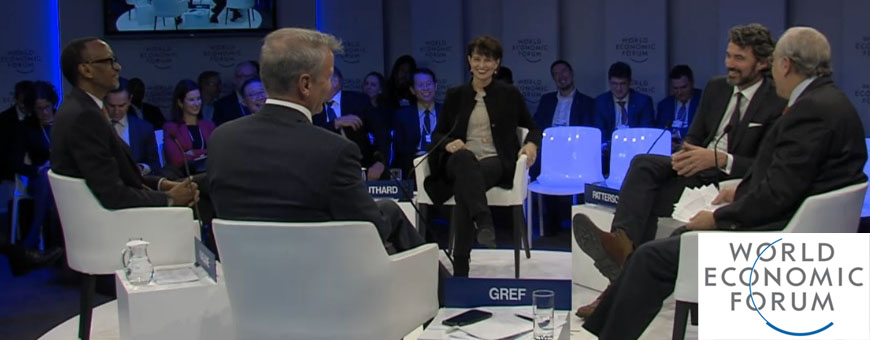
At one of the most important events of the year, organized by the World Economic Forum (WEF) in Davos, the world’s foremost political and business leaders met once again to discuss digitization and other key global issues.
The wide range of debates which addressed different perspectives and dimensions, included one called “Shaping a National Digital Strategy”, chaired by Ángel Gurría, Secretary-General of the OECD, and also counted with keynote speakers.
One of the topics which stood out in the introduction of the debate was the value of digitization as an element with great potential for the development of nations, but also as something which can be perceived as a threat.
Gurría acknowledged that workers may regard digitization as a risk, due to issues such as automation and subsequent job losses. However, there is a significant reasoning, that although technology competes with the skills of the workforce, the same technology can improve the skills of that same workforce, enabling it to be successful in this new digital age.
Ángel Gurría: “Digitization is not something we can decide whether to adopt or not. It is inevitable and we have to embrace it, because there is no alternative”.
Another of the fears concerning digitization, mentioned by Doris Leuthard, President of Switzerland, is about how individuals’ data is handled. Leuthard emphasized that only a few large transnational internet companies have succeeded in massively exploiting data and have now accumulated great power. She commented that work should be done to enhance competition, whereby the companies providing services should be more trustworthy in the exploitation of data, with the absence of any kind of abuse. “Citizens must be the owners of their data and we should consider the design of a comprehensive international framework for a public data policy”, she pointed out in her speech.
With regard to infrastructure, Paul Kagame, President of Rwanda, and the President of Switzerland commented that there is a lot of talk about connected cars which drive alone, but great investment in connectivity infrastructure is needed, as this is ultimately the basis for all these breakthroughs. Paul Kagame also said in his speech that the digital agenda must be integrated into the country’s strategy, with the aim of creating productivity, being more efficient and ensuring that the economy grows for the benefit of the citizens. “This is only possible by working closely with the private sector, which provides investment and innovation. This will lead to significant increases in the levels of development and reduce the time required by a country to improve its living standards,” stated.
Another key issue for the development of the digital agenda, upon which all the panellists agreed, was the need to transform education. Gavin Patterson, CEO of BT Group, mentioned that the curriculum for primary school children in the United Kingdom has been modified to include “coding” or programming within the training process. This is undoubtedly an element of transformation in the teaching process and will result in a digital skills generation. Herman Gref, CEO of Sberbank, mentioned that we must now accompany training in hard skills and soft skills with similar education in digital skills. Leuthard also pointed out that it is very important to involve people who do not have the sufficient skills to ensure the success of the digitization process.
RECENT STUDIES IN LATAM
The study published by the Economic Commission for Latin America (ECLAC) on the “State of broadband in Latin America and the Caribbean” provides a compilation of the digital agendas in existence in the region.
Upon the basis of this document, we can affirm two things:
1) A considerable number of countries in the region (14, according to the study) are aware of the need to embrace digitization and have begun to work on strategies to achieve it.
2) Although the ingredients necessary for a successful digital agenda generally cover the same issues, not all the strategies in the region are the same. This leads to differences in the countries digitization index and an even greater difference in the ones which do not have strategies of this kind.
Furthermore, a study titled “Business initiatives and public policies to accelerate the development of an Ibero-American digital ecosystem”, which has been commissioned by the Ibero-American Council for Productivity and Competitiveness (CIPC), of which Telefónica forms part, draw up a set of public policy proposals and private initiatives to exploit all the digital potential in Latin America.
In this study, conducted by Dr. Raúl Katz, proposals are made for the development of digitization and the promotion of innovation:
- The development of “systemic facilitators” which create the suitable conditions for change.
- The use of the State as a market creator.
While recognizing that different approaches may be considered in the development of digital strategies, it is clear that in international terms, there is already broad consensus. These include, among other factors, the importance of connectivity as a basic platform to facilitate the digital revolution and the need to develop a holistic view of the problem, affording pre-eminence to human capital (especially the development of digital skills), digital education and digital entrepreneurship.
The work performed by the ECLAC and the ICPC can serve as an input to steer the reflections of the governments and authorities involved in the digitization process in Latin America. This will involve opening up the debate, seeking to give the region a more prominent role in a revolution, the digital revolution, which is only just beginning.










